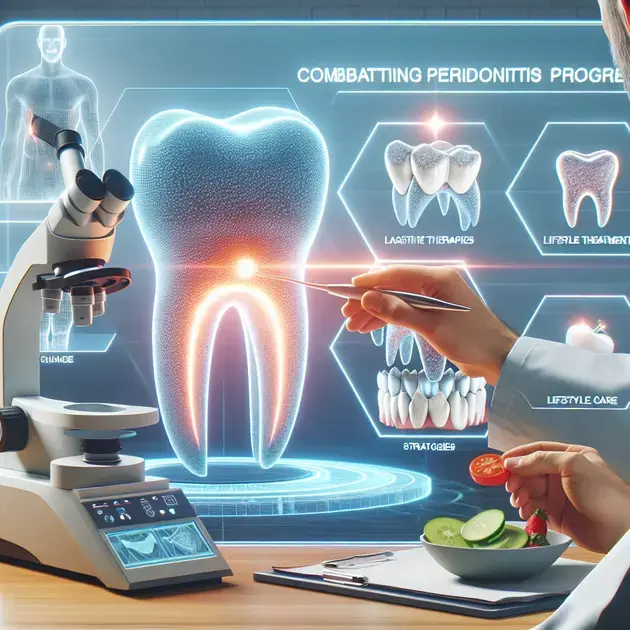Periodontitis is a serious gum infection that damages the soft tissue and destroys the bone that supports your teeth. If left untreated, it can lead to tooth loss and other health problems. Finding effective medication options for periodontitis is crucial in managing this condition and preventing further damage.
With advancements in dental research and technology, there are now several effective medication options available for treating periodontitis. From antibiotics to antimicrobial mouthwashes, these treatments can help reduce inflammation, fight infection, and promote healing in the gums and bone surrounding the teeth.

Understanding Periodontitis Treatment Options
When it comes to treating periodontitis, there are several options available depending on the severity of the condition. The first step is usually non-surgical treatment, which includes scaling and root planing to remove plaque and tartar from the teeth and roots. This procedure is often done by a dental hygienist and helps to clean the deep pockets that have formed around the teeth due to gum inflammation.
If non-surgical methods are not effective or if the periodontitis is advanced, surgical treatment may be necessary. Procedures such as flap surgery, bone grafts, or tissue regeneration can help repair the damage caused by periodontitis and prevent further progression of the disease. These surgeries are usually performed by a periodontist, a specialist in gum disease treatment.
For more advanced cases of periodontitis, medication may also be prescribed to help control the infection and inflammation. Antibiotics, both oral and topical, can be used in conjunction with other treatments to combat the bacteria causing the gum disease. It’s important to follow your dentist’s or periodontist’s recommendations carefully when taking medication to ensure the best results.
Additionally, maintaining good oral hygiene at home is crucial in managing periodontitis. Brushing and flossing regularly, using an antiseptic mouthwash, and attending regular dental cleanings and check-ups are essential steps in preventing and treating gum disease. Monitoring your progress and staying consistent with your oral care routine will help improve the health of your gums over time.
Remember, each person’s case of periodontitis is unique, so treatment options may vary. It’s important to work closely with your dental professionals to determine the best plan for your specific needs and to achieve optimal results in managing your periodontal health.
The Importance of Antibiotics in Periodontitis Management
Antibiotics play a crucial role in the management of periodontitis, especially in cases where the infection is severe or recurrent. These medications help to target and eliminate the harmful bacteria that cause gum disease, reducing inflammation and preventing further damage to the gums and bone supporting the teeth.
Before starting antibiotic treatment for periodontitis, your dentist or periodontist will conduct a thorough evaluation to determine the most effective medication for your specific condition. This may involve taking a sample of the bacteria in your mouth to identify which antibiotics will be most successful in combating the infection.
Antibiotics for periodontitis can be prescribed in various forms, including pills, mouth rinses, gels, or fibers placed directly into the pockets around the teeth. It’s essential to follow your healthcare provider’s instructions carefully when taking antibiotics to ensure their effectiveness and avoid potential side effects.
In addition to taking antibiotics, maintaining good oral hygiene practices is essential for successful periodontitis management. Brushing and flossing regularly, using an antimicrobial mouthwash, and attending dental cleanings are all important steps in conjunction with antibiotic therapy. These combined efforts help to control the infection and promote healing of the gums.
It’s important to note that antibiotics alone are not a cure for periodontitis; they are just one component of a comprehensive treatment plan. Working closely with your dental team and following their recommendations diligently will help improve the outcomes of antibiotic therapy and overall management of your periodontal health.
Exploring Antimicrobial Mouthwashes for Treating Periodontitis
Antimicrobial mouthwashes are an effective adjunctive treatment for periodontitis, helping to reduce the levels of bacteria in the mouth and control gum inflammation. These specialized mouthwashes contain active ingredients that target and kill the bacteria responsible for gum disease, promoting healthier gums and preventing further damage to the teeth and supporting structures.
When choosing an antimicrobial mouthwash for periodontitis, look for products containing ingredients like chlorhexidine, cetylpyridinium chloride, or essential oils known for their antibacterial properties. These components help to disrupt the biofilm that forms on the teeth and gums, reducing plaque buildup and preventing infection.
To use an antimicrobial mouthwash effectively, follow the instructions provided on the product label or as recommended by your dentist. Typically, you will swish the mouthwash around your mouth for a specific amount of time before spitting it out. Avoid eating or drinking for at least 30 minutes after using the mouthwash to allow the active ingredients to work effectively.
It’s important to incorporate antimicrobial mouthwash into your daily oral hygiene routine, especially if you have been diagnosed with or are at risk for periodontitis. Along with regular brushing, flossing, and dental check-ups, using an antimicrobial mouthwash can help control bacteria and inflammation in the gums, promoting better periodontal health over time.
Remember, antimicrobial mouthwashes are not a substitute for professional periodontal treatment but can be a valuable addition to your oral care regimen. Consult with your dentist or periodontist to learn more about incorporating antimicrobial mouthwash into your comprehensive periodontitis management plan.

Underlying Factors Affecting Periodontitis Progression
Periodontitis progression can be influenced by various underlying factors that can exacerbate the condition if not properly managed. One key factor is poor oral hygiene practices, such as irregular brushing and flossing, which can lead to the buildup of plaque and tartar. This buildup can then irritate the gums, causing inflammation and potentially leading to periodontitis.
Another important factor is genetics, as some individuals may be more predisposed to developing periodontitis due to their genetic makeup. Additionally, certain medical conditions like diabetes can also contribute to the progression of periodontitis by affecting the body’s ability to fight off infections, including those in the gums.
Smoking is a well-known risk factor for periodontitis progression, as tobacco use can weaken the immune system and hinder the body’s ability to combat gum infections. Hormonal changes, such as those experienced during pregnancy or menopause, can also play a role in exacerbating periodontitis.
Furthermore, poor nutrition and diet can impact periodontitis progression, as a diet lacking in essential nutrients can weaken the immune system and make it harder for the body to combat gum infections. Lastly, stress can contribute to periodontitis progression by increasing inflammation in the body and compromising the immune system’s ability to respond effectively.
Innovative Strategies for Periodontitis Treatment Enhancement
Advancements in periodontal treatment have led to innovative strategies that can enhance the effectiveness of managing and treating periodontitis. One such strategy is the use of laser therapy, which can target and remove infected tissue more precisely than traditional methods, leading to faster healing and reduced discomfort for the patient.
Another innovative approach is the use of regenerative techniques, such as bone grafts and tissue engineering, to restore damaged bone and gum tissue caused by periodontitis. These techniques promote the regeneration of lost tissue, improving the overall health and stability of the gums and surrounding structures.
Furthermore, the development of personalized treatment plans based on genetic testing and microbial analysis has allowed for more targeted and effective interventions for periodontitis. By identifying specific genetic markers or microbial strains associated with the disease, dentists can tailor treatment approaches to better address individual patient needs.
Advances in telemedicine and virtual consultations have also made periodontal care more accessible and convenient for patients, allowing for remote monitoring and follow-up appointments to ensure the success of treatment plans. This approach can help improve patient compliance and overall treatment outcomes.
The Impact of Lifestyle Changes on Periodontitis Management
Lifestyle changes can have a significant impact on the management of periodontitis and can help slow down or even reverse the progression of the disease. One crucial lifestyle change is quitting smoking, as tobacco use not only exacerbates periodontitis but also hinders the success of treatment interventions. By quitting smoking, patients can greatly improve their periodontal health and treatment outcomes.
Adopting a balanced and nutritious diet rich in vitamins and minerals can also support periodontitis management by boosting the immune system and promoting gum health. Avoiding sugary foods and beverages that can contribute to plaque buildup and bacterial growth is essential for preventing further progression of the disease.
Regular exercise plays a role in periodontitis management by reducing inflammation in the body and improving overall health, which can positively impact gum health. Additionally, stress management techniques such as mindfulness, meditation, and yoga can help lower stress levels and decrease inflammation, thereby supporting periodontitis management.
Establishing a consistent oral hygiene routine that includes brushing twice a day, flossing daily, and using antimicrobial mouthwash can also aid in managing periodontitis and preventing its progression. Regular dental check-ups and cleanings are essential for monitoring the disease’s status and adjusting treatment plans as needed.
Conclusion
Periodontitis progression is influenced by various factors such as poor oral hygiene practices, genetics, smoking, medical conditions like diabetes, poor nutrition, and stress. These factors can exacerbate the condition if not effectively managed, leading to inflammation and potential gum disease.
Advancements in periodontal treatment have introduced innovative strategies like laser therapy and regenerative techniques that target infected tissues precisely, promoting faster healing and tissue regeneration. Personalized treatment plans based on genetic testing and microbial analysis have also enhanced interventions for better patient outcomes.
Lifestyle changes play a crucial role in managing periodontitis. Quitting smoking, following a balanced diet, engaging in regular exercise, and practicing stress management techniques can significantly impact the disease’s progression. Establishing a consistent oral hygiene routine and attending regular dental check-ups are essential for monitoring and preventing periodontitis advancement.



